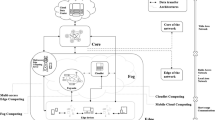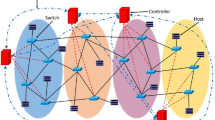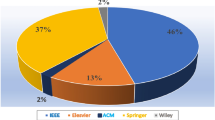Abstract
Mobile edge computing (MEC) has emerged as a promising technology that can revolutionize the future of mobile networks. MEC brings compute and storage capabilities to the edge of the network closer to end-users. This enables faster data processing and improved user experience by reducing latency. MEC has the potential to decrease the burden on the core network by transferring computational and storage responsibilities to the edge, thereby reducing overall network congestion. Load balancing is critical for effectively utilizing the resources of the MEC. This ensures that the workload is distributed uniformly across all of the available resources. Load balancing is a complex task and there are various algorithms that can be used to achieve it, such as round-robin, least connection, and IP hash. To differentiate between heavily loaded and lightly loaded servers, current load balancing methods use an average response time to gauge the load on the edge server. Nevertheless, this approach has lower precision and may result in an unequal distribution of the workload. Our study introduces a dynamic threshold calculation technique that relies on a response-time threshold of the edge servers using K-means clustering. K-means based proposed algorithm classifies the servers in two sets (here K = 2), i.e., overloaded and lightly loaded edge servers. Consequently, workload is migrated from overloaded to lightly loaded servers to evenly distribute the workload. Experimental results show that the proposed technique reduces latency and improves resource utilization.








Similar content being viewed by others
Data availability
No data was used for this article.
References
Zhang, F., Deng, R., Zhao, X., & Wang, M. M. (2021). Load balancing for distributed intelligent edge computing: A state-based game approach. IEEE Transactions on Cognitive Communications and Networking.
Zaman, S. K. u., et al. (2021). Mobility-aware computational offloading in mobile edge networks: A survey. Cluster Computing, 24(4), 2735–2756. https://doi.org/10.1007/s10586-021-03268-6
Wang, S., Zhang, X., Zhang, Y., Wang, L., Yang, J., & Wang, W. (2017). A survey on mobile edge networks: Convergence of computing, caching and communications. IEEE Access, 5, 6757–6779.
Qu, J., Zhou, L., Zhang, G., Wu, D., Zheng, J., & Cai, Y. (2018). Secure caching in D2D content sharing. In 2018 IEEE International Conference on Communications Workshops (ICC Workshops) (pp. 1–6). IEEE.
Yasir, M., Maqsood, T., Rehman, F., & Mustafa, S. (2022). CoPUP: Content popularity and user preferences aware content caching framework in mobile edge computing. Cluster Computing 1–15.
Safi, A., Ahmad, Z., Jehangiri, A. I., Latip, R., Khan, M. A., & Ghoniem, R. M. (2022). A fault tolerant surveillance system for fire detection and prevention using LoRaWAN in smart buildings. Sensors, 22(21), 8411.
Thananjeyan, S., Chan, C. A., Wong, E., & Nirmalathas, A. (2020). Mobility-Aware energy optimization in hosts selection for computation offloading in multi-access edge computing. IEEE Open Journal of the Communications Society, 1, 1056–1065.
Kaur, M., & Aron, R. (2021). A systematic study of load balancing approaches in the fog computing environment. The Journal of Supercomputing 1–46.
Fan, Q., & Ansari, N. (2018). Towards traffic load balancing in drone-assisted communications for IoT. IEEE Internet of Things Journal, 6(2), 3633–3640.
Zhao, P., Tao, J., Rauf, A., Jia, F., & Xu, L. (2021). Load balancing for energy-harvesting mobile edge computing. IEICE Transactions on Fundamentals of Electronics, Communications and Computer Sciences, 104(1), 336–342.
Jia, M., Liang, W., Xu, Z., & Huang, M. (2016). Cloudlet load balancing in wireless metropolitan area networks. In IEEE INFOCOM 2016-The 35th Annual IEEE International Conference on Computer Communications (pp. 1–9). IEEE.
Xiao, Z., et al. (2019). Vehicular task offloading via heat-aware MEC cooperation using game-theoretic method. IEEE Internet of Things Journal, 7(3), 2038–2052.
uz Zaman, S. K., Maqsood, T., Ali, M., Bilal, K., Madani, S. A., & Khan, A. (2019). A load balanced task scheduling heuristic for large-scale computing systems. The Computer Systems Science and Engineering, 34, 4.
Zhao, J., Li, Q., Gong, Y., & Zhang, K. (2019). Computation offloading and resource allocation for cloud assisted mobile edge computing in vehicular networks. IEEE Transactions on Vehicular Technology, 68(8), 7944–7956.
Zhang, J., Guo, H., Liu, J., & Zhang, Y. (2019). Task offloading in vehicular edge computing networks: A load-balancing solution. IEEE Transactions on Vehicular Technology, 69(2), 2092–2104.
Zhan, W., Luo, C., Min, G., Wang, C., Zhu, Q., & Duan, H. (2020). Mobility-aware multi-user offloading optimization for mobile edge computing. IEEE Transactions on Vehicular Technology, 69(3), 3341–3356.
Ahani, G., & Yuan, D. (2019). BS-assisted task offloading for D2D networks with presence of user mobility. In 2019 IEEE 89th Vehicular Technology Conference (VTC2019-Spring). IEEE.
Misra, S., & Bera, S. (2019). Soft-van: Mobility-aware task offloading in software-defined vehicular network. IEEE Transactions on Vehicular Technology, 69(2), 2071–2078.
Jehangiri, A. I., et al. (2022). LiMPO: Lightweight mobility prediction and offloading framework using machine learning for mobile edge computing. Cluster Computing.
u. Zaman, S. K., et al. (2022). COME-UP: Computation offloading in mobile edge computing with LSTM based user direction prediction. Applied Sciences, 12(7), 3312.
Liu, Z., Wang, X., Wang, D., Lan, Y., & Hou, J. (2019). Mobility-aware task offloading and migration schemes in SCNs with mobile edge computing. In 2019 IEEE Wireless Communications and Networking Conference (WCNC) (pp. 1–6). IEEE.
Zaman, S. K. U., Khan, A. U. R., Malik, S. U. R., Khan, A. N., Maqsood, T., & Madani, S. A. (2017). Formal verification and performance evaluation of task scheduling heuristics for makespan optimization and workflow distribution in large-scale computing systems. Computer Systems Science and Engineering, 32(3), 227–241.
Chu, C.-H. (2021). Task offloading based on deep learning for blockchain in mobile edge computing. Wireless Networks, 27(1), 117–127.
Duan, W., Gu, X., Wen, M., Ji, Y., Ge, J., & Zhang, G. (2021). Resource management for intelligent vehicular edge computing networks. IEEE Transactions on Intelligent Transportation Systems.
Yadav, R., Zhang, W., Kaiwartya, O., Song, H., & Yu, S. (2020). Energy-latency tradeoff for dynamic computation offloading in vehicular fog computing. IEEE Transactions on Vehicular Technology, 69(12), 14198–14211.
Yadav, R., et al. (2021). Smart healthcare: RL-based task offloading scheme for edge-enable sensor networks. IEEE Sensors Journal, 21(22), 24910–24918.
Zhang, W., Yadav, R., Tian, Y.-C., Tyagi, S. K. S., Elgendy, I. A., & Kaiwartya, O. (2022). Two-phase industrial manufacturing service management for energy efficiency of data centers. IEEE Transactions on Industrial Informatics, 18(11), 7525–7536.
Ling, C., et al. (2022). An edge server placement algorithm based on graph convolution network. IEEE Transactions on Vehicular Technology.
Pydi, H., & Iyer, G. N. (2020). Analytical review and study on load balancing in edge computing platform. In 2020 Fourth International Conference on Computing Methodologies and Communication (ICCMC) (pp. 180–187). IEEE.
Lv, B., Wang, Z., Huang, T., Chen, J., & Liu, Y. (2010). A hierarchical virtual resource management architecture for network virtualization. In 2010 6th International Conference on Wireless Communications Networking and Mobile Computing (WiCOM) (pp. 1–4). IEEE.
Sztrik, J. (2010). Queueing theory and its applications, a personal view. In Proceedings of the 8th International Conference on Applied Informatics (Vol. 1, pp. 9–30).
Funding
No funding was received for this research.
Author information
Authors and Affiliations
Contributions
TM and SKZ, conceived the main idea, designed the methods and performed literature review; AQ and FR performed the simulations and experiments; SM and JS analyzed the results and drafted/revised the manuscript critically. All authors have read and agreed to the submitted version of the manuscript. All authors have read and agreed to this version of the manuscript.
Corresponding author
Ethics declarations
Competing interests
The authors declare no competing interests.
Ethical statement
This is the author's own work not submitted anywhere else.
Informed consent
Not applicable.
Additional information
Publisher's Note
Springer Nature remains neutral with regard to jurisdictional claims in published maps and institutional affiliations.
Rights and permissions
Springer Nature or its licensor (e.g. a society or other partner) holds exclusive rights to this article under a publishing agreement with the author(s) or other rightsholder(s); author self-archiving of the accepted manuscript version of this article is solely governed by the terms of such publishing agreement and applicable law.
About this article
Cite this article
Maqsood, T., uz Zaman, S.K., Qayyum, A. et al. Adaptive thresholds for improved load balancing in mobile edge computing using K-means clustering. Telecommun Syst (2024). https://doi.org/10.1007/s11235-024-01134-5
Accepted:
Published:
DOI: https://doi.org/10.1007/s11235-024-01134-5




